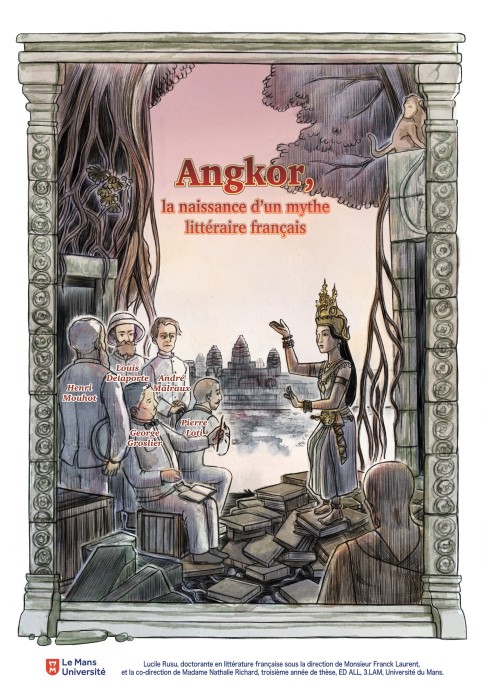RUSU Lucile
RUSU Lucile
RUSU LucileDocteure - Thèse : "Le roman d'Angkor - Littérature et archéologie dans le contexte de l'indochine coloniale / Angkort tales - Literature and archeology in colonial indochina context"
Thèse : Le roman d'Angkor - Littérature et archéologie dans le contexte de l'indochine coloniale / Angkort tales - Literature and archeology in colonial indochina context
The birth of modern archeology (to quote the title of Eve Gran-Aymerich's book, 1998) was accompanied in the 19th century and first regarding the topic of ancient Mediterranean civilizations (from Rome and the Near East, to Greece and Egypt) by the emergence of a complex cultural configuration, interlocking a scientific know-how under autonomous methodological development, the rise of artistic as well as literary depictions and reuses of brand new knowledge (especially through the fantasy genre or the adventure novel), and the promotion of a mass culture in full swing.
"Thus do restoration of the past techniques spread in visual as well as text-based formats, through popular as well as literate channels, in the public and private space, showing that the term "archeology" does not only designate a field of scientific knowledge along with practices which were by the way still fairly weakly standardised in the 19th century, but covers a much larger cultural reality. [...] we may speak of "archeological cultures" to describe the circulation of the multifaceted knowledge, appropriations and practices that they give birth to in the very large and very diverse spheres of society" (Nathalie Richard, 2017).
This situation seems however to have perpetuated into the first decades of the 20th century, even if that meant its default scope shifted to even further away "somewhere elses", notably in the Far East. In France, for obvious geopolitical reasons, the archeological site of Angkor has thus generated a remarkably profuse cultural constellation of knowledge and portrayals. Vaguely (but perhaps all the more powerfully) revealed to the West by the tales of a French traveler, published in the Parisian press of the Second Empire, the scientific potential of the Angkorian ensemble starts being tapped into at the beginning of the century, mostly thanks to the efforts of the then starting out Far East French School. Starting with the 1910s and during the whole of the inter-war period, it entails many literary creations (novels or writers' travel narratives) in which, besides providing for a lavish exotic setting, it forms a compendium of the marvelous appeal of sheer mystery, and brings about the circulation of fledgling or plain new bodies of archeological, historical and ethnographical knowledge.
Auxiliary to the science of archeology as per its "popularisation" capabilities, literature often also acts as one of its challengers, dramatising thus the sustained competition between the "two cultures" (Literature vs Human Sciences) for instance through the recurring motif of the amateur archeologist and adventurer, getting the better off, inclusively in the area of knowledge, to the official and scholarly archeologist, whose status is guaranteed by the state administration (cf. Pierre Benoit's Le roi Lépreux, or André Malraux's La Voie Royale) - in a way an offshoot of the structuring rivalry in the modern detective novel between the amateur (journalist or other "private eye") and the professional policeman. This antagonism can also come to light "on the other side", that of the archeologists, not only in the usage of their expertise in order to publicly validate or invalidate literary works, but also through their ability to directly communicate their works to the "public at large" concurrently targeted by writers - some archeologists going as far as pursuing a career in novel writing (e.g. George Groslier).
These literary depictions also raise an issue with respect to the different ways the site is commodified, be it through the international market of extra-European works of art, or through the establishment of elements of the fledgling industry of tourism (often exposed - but even more often obscured). Lastly, they strongly contribute to the construction of the alterity, in the specific context of colonial domination.
It is this complex configuration that the thesis will attempt to explore, primarily examining a body of works, most of which have been left largely untouched by recent literary history, but whose impact at the time was clear, and whose more or less subterranean influence may well still be felt.

Thèse dirigée par Franck Laurent, co-encadrée par Nathalie Richard.
Début de thèse le 01/10/2018. Soutenance le 14/01/2022.
PUBLICATIONS, INTERVENTIONS NON-PUBLIÉES À DES CONGRÈS, COLLOQUES, JOURNÉES D’ÉTUDES ETC.
- Horangi, Grand Manuel de Coréen, Armand Colin, 2021
- Grammaire Pratique du coréen intermédiaire, Armand Colin, 2021
- Kitsuné, Grand Manuel de Japonais, Armand Colin, 2022







